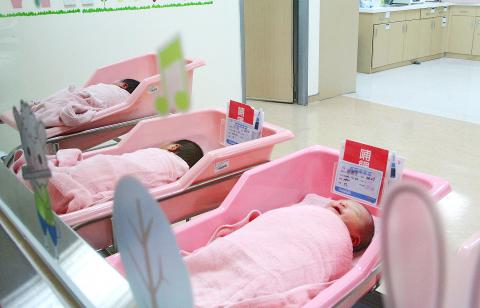National Taiwan University (NTU) Hospital’s Newborn Screening Center has worked with hospitals and clinics across Taiwan, conducting screening for around 120,000 newborns between 2014 and 2016 and finding eight babies with spinal muscular atrophy (SMA). Two of the babies have been transferred to a different hospital to receive treatment.
SMA is a recessive genetic disease. According to Chien Yin-hsiu, a doctor at NTU Hospital’s Department of Medical Genetics and Department of Pediatrics, SMA patients may appear no different from healthy children in the first one or two months after their birth, but they will gradually lose the ability to move their limbs, to breath and to swallow, which eventually leads to death, usually around the age of one. However, in some cases, the onset of SMA does not occur until the patient is 10 or 20 years old, or even older.
Through extensive newborn screening, NTU Hospital has proven that SMA can be diagnosed in newborns through such screenings. The research was published in the July issue of the Journal of Pediatrics. Now hospitals in the US and Japan have followed NTU Hospital’s footsteps and started conducting SMA screening for newborns.

Photo: CNA
照片:中央社
According to statistics, if untreated or unaided by ventilators, only 10 percent of children with SMA reach their first birthday. However, children who begin receiving treatment before the onset of the disease may have reduced symptoms and higher survival rates.
(CNA, Translated by Tu Yu-an)
從二○一四年到去年,台大醫院新生兒篩檢中心整合全台醫療院所,為十二萬嬰兒進行篩檢,找到八名患有脊髓型肌肉萎縮症的嬰兒,並轉介其中兩人進行治療。
脊髓型肌肉萎縮症是隱性遺傳疾病。台大醫院基因學部暨小兒部主治醫師簡穎秀說,患童剛出生一、兩個月內可能很正常,但四肢會漸漸不能動,呼吸跟吞嚥也會有困難,之後約在一歲時死亡,但有些病患也可能在十歲或二十歲以後才會發病。
台大團隊透過大規模篩檢證實脊髓型肌肉萎縮症患嬰可經由篩檢確認,成果已發表於今年七月的《小兒科期刊》。現在美國、日本團隊也都追隨台大腳步,為新生兒進行該病症的篩檢。
根據統計,罹病的孩子如果沒有治療或使用呼吸器,九成活不過一歲,但若在發病前開始藥物治療,可延緩症狀並提升孩子的活存率。
(中央社)

Have you ever dreamed of hiking Taiwan’s majestic Mt. Jade or visiting Peru’s breathtaking Machu Picchu? These adventures sound amazing, but there’s something you should know about first: “altitude sickness.” This condition strikes when you climb to a higher elevation too quickly. The higher you go, the thinner the air becomes, making it harder for your body to absorb oxygen. The symptoms usually begin within hours of reaching high altitudes — about 2,500 meters or higher. You might experience headaches, dizziness, nausea, shortness of breath, or extreme fatigue. These symptoms can last for several days. The severity of altitude sickness varies

★ Bilingual Story is a fictionalized account. 雙語故事部分內容純屬虛構。 “Get in. It’s pouring.” She slid into the back seat, drenched and silent. “Tissues?” the driver asked. “No, thank you,” she said. Water beaded off her hair, ran from her coat, and made a small lake on the vinyl. She kept her head down, long black strands clinging to her face. “Where to?” She gave an address. “Funeral?” he asked as they slipped into the Xinhai Tunnel, rain fading to a hollow drum. She glanced up, puzzled. “No. Why?” “Crematorium’s about the only thing here.” He caught her eyes in the mirror.

A: In addition to boyband Energy’s concerts, Taiwan’s first major male dance revue has attracted attention. B: Several South Korean male dance revues and Australia’s Thunder from Down Under often tour Taiwan. Now Taiwan’s first all-male revue has finally appeared. A: According to the Liberty Times, Muscle High: A Male Dance Revue from Taiwan, featuring 13 hunks, opened last month and will run until Sept. 14. B: The rise of “hunk fever” in recent years has even caused a trend of working out in Asia. A: Let’s go to the Taipei Music Center’s Sub Livehouse for the show. A:

A: Any fun events happening this weekend? B: Boyband Energy’s concerts and Taiwan’s first major male dance revue have both sparked anticipation recently. A: Energy staged a comeback last year — 15 years after they disbanded — and they’re now more popular than ever. B: Their megahit “Friday Night” even won Song of the Year at the Golden Melody Awards. A: To pay tribute to the Queen of Pop Madonna, they added her choreography of 16 continuous jump squats to their music video, prompting a “16-squat challenge” that went viral across Taiwan. Do you wanna try it out? A: